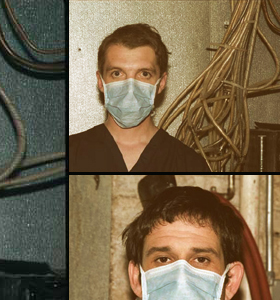Saturday, January 17, 2026 |
||

CLINIC: What's Behind Those Surgical Masks? Taking the pulse of the cool British export Interview Yancey Strickler Photography Brendan Colthurst |
|

Ade Blackburn and Hartley Ade Blackburn: "I'm sure in the '60s, with someone like the Velvets, someone's dad was saying to them, 'It just sounds like distorted Howlin' Wolf.' " |
Strickler: How do you capture the spontaneity?
Turney: Record very quickly. [laughs] Strickler: Like in the song "Porno" you have the burst of static that comes out of nowhere. Was that an accident? Turney: Just a little blip in the studio, in the recording process. You like to keep little sounds. There's a certain spontaneous nature to the music, but there is also a certain plan. There's a structure where certain things fit in and then whatever comes out of that, by chance, is even better. Blackburn: Things that happen once in songs, I think that's really good. You've got the basics. If the basics are strong enough, then you can mess around with the other bits and it gives you freedom again to do whatever you feel like. Turney: Anything that can create an impression, or stands out to the listener, I think is a good thing. It keeps reminding you that it's a band playing live. It's not faked in anyway. Nobody's gone down to the pub while the producer brings in four robots to put a song together. Strickler: When Dylan wrote his songs, political times were a factor. With the Stones, the further they went into the South the dirtier the music got. Is your music informed by your environment, socially and physically? Blackburn: I'd say so, but not in an overtly direct way. Just with where you live and the pace of the songs. I wouldn't feel comfortable for us to do anything that was political in any way. But there's still a nervous energy to the songs which tends to imply what things are more like in everyday life. I prefer that, if something is hinting rather than just stating the case. Strickler: Was the recording of Internal Wrangler hindered by lack of time or money? Were there things you wanted to do to it that you couldn't, for whatever reason? Blackburn: We could have spent more money on it if we wanted to, but we wanted to have a fairly raw feel to it. When you look back you think, "Perhaps that could have been different." You're more hindered by your own expectations or your own standards at the time. Turney: It's more like achieving the impossible. Nothing ever sounds like you anticipate it to sound. Being in a studio is almost like a couple of weeks of coming to terms with what the album is going to sound like rather than what you wanted it to sound like in the first place. Strickler: People are obviously paying more attention to you now. Was that the goal with Internal Wrangler? Turney: There's never been any sort of hidden agenda about "We're going to play for this many people." It's more like the better the music becomes it seems that comes naturally with it. The more time spent on the songs, the more time doing the music — which is actually what we're all into doing — the goals are almost achieved by themselves. But the past two years have been a step up all the time, of different people getting into it. Different people inviting us to play with them, or getting invited to do certain things, which seems to be the next step of us taking our time and doing the songs in the first place. It seems to come naturally. Blackburn: With the album coming out a while ago in Britain, we didn't even know whether it would be released outside of Britain when we were making it, so it wasn't a global takeover plan. |